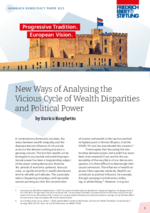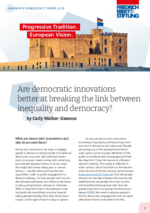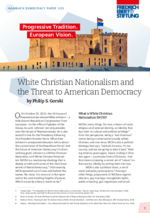Hambach Democracy Dialogue
Focus of HDD 2023: Defending Democracy in Times of Multiple Crises
In recent years, overlapping crises have preoccupied Europe: the Russian invasion of Ukraine, the rise of the illiberal right, COVID 19, and the energy and cost-of-living crises are some of them. These multiple crises challenge European democracies in different ways. At the Hambach Democracy Dialogue 2023 we will discuss how Social Democracy can be defended under these circumstances. Our distinguished speakers and experts will look from different angles at how democracies should respond to these developments.
On 15 June 2023 at 16:00 CEST, we will broadcast Eva Illouz sharing her experiences from Israeli politics in her keynote "Populism as Emotional Politics: The Perspectives from Israel". Later, we will discuss whether we are witnessing a battle between autocracies and democracies with experts such as Staffan Lindberg (Director of the V-Dem Institute), Ummu Salma Bava (Professor at Jawaharlal Nehru University in India), Sven Mikser, MEP (former Minister of Defence and Foreign Affairs of Estonia) and Karolina Zbytniewska (Editor-in-Chief of EURACTIV Poland). Tune in!
Contact:
Marco Schwarz
marco.schwarz(at)fes.de
Stephanie Hepper
stephanie.hepper(at)fes.de
Filip Milacic
Filip.milacic(at)fes.de
Highlight Video of the HDD23
Online Conference Program
CONFERENCE OPENING & WELCOME
Ellen Diehl, Head of FES Regional Office Rhineland-Palatinate/Saarland in Mainz
Johanna Lutz, Head of FES Democracy of the Future in Vienna
Christiane Kesper, Director of the FES EU Office in Brussels
KEYNOTE SPEECH – POPULISM AS EMOTIONAL POLITICS: THE PERSPECTIVE FROM ISRAEL
Eva Illouz, Professor at the Hebrew University of Jerusalem
LIVE SESSION – ARE WE WITNESSING A STRUGGLE BETWEEN DEMOCRACIES AND AUTOCRACIES?
On the one hand, there are those who argue that Russian aggression against Ukraine has sharpened the divide between autocracies and democracies. Accordingly, the world has become torn between two opposing clusters along a clear ideological line: an alliance of democracies, led by the United States, is now facing an alliance of autocratic states, centered upon Russia and particularly China. Following this line of thought, autocracy vs. democracy thus forms a new global conflict line. On the other hand, many are contesting this binary view of the world. They find the warnings about the arrival of the new Cold War that pits autocracies against democracies to be a simplified explanation of much more nuanced processes. Just as we cannot talk about the global crisis of democracy as there is not one but many differently developed democracies, neither can we talk about the uniformity of interests of all global democracies that originate in ideology, or so the argument goes.
This panel will debate these two interpretations. It will also address the question of how democracy should be more effectively defended under the new circumstances marked by the change of the international context (weaker support for democracy in the global arena and a rising assertiveness of autocracies). A special emphasis will be put on new ideas to empower local political and civil society actors to fight for opening democratic spaces.
Staffan Lindberg, Director of the V-Dem Institute;
Sven Mikser, MEP and former Defence and Foreign Affairs Minister of Estonia;
Karolina Zbytniewska, Chief Editor of EURACTIV Poland,
Ummu Salma Bava, Professor at the Jawaharlal Nehru University in India
moderated by Ivana Dragičević, Europe’s Futures Fellow at IWM, Vienna
END OF LIVESTREAM
HDD in the news
„Politik ist der Kampf zwischen jenen, die Angst schüren, und jenen, die Hoffnung stiften“
What can Europe's Left do against its own impending irrelevance? François Hollande in conversation with the Falter. (Paywall and in German)
Undemocratic, but still successful with voters
How autocrats convince voters to sacrifice abstract interests like democracy explains our colleague Filip Milačić at the ips-journal.
Democracies versus autocracies - this is not the new global conflict line
The West is reducing the debate on Russia's war in Ukraine to the defence of democracy. Instead, it should be about the defence and inviolability of inter-state borders, says Ummu Salma Bava in der Standard.
Democracy must regain its appeal
It will be much easier for us to persuade the citizens of other countries to stand up to autocrats, if democratic nations manage to reverse the trend of declining trust in their own countries, writes Sven Mikser in EurActiv Poland.
Europe must defend itself - resolutely and in a coordinated manner
Europe faces numerous crises that test its identity and cohesion. Europe must overcome authoritarian excesses - and can do so, writes François Hollande in an Op-ed in the SZ (in German).
Saving the EU from disintegration
The ongoing rule of law backsliding in Poland and Hungary is threatening the unity and integrity of the European Union. Dr Maria Skóra explains what needs to be done to save the EU from disintegration.
Key Facts
HDD Papers
Borghetto, Enrico
New ways of analysing the vicious cycle of wealth disparities and political power
Download (PDF) (230 KB, PDF-File)
Walker-Dawson, Carly
Are democratic innovations better at breaking the link between inequality and democracy?
Download (PDF) (260 KB, PDF-File)
Gorski, Philip S.
White christian nationalism and the threat to American democracy
Download (PDF) (300 KB, PDF-File)
Impressions of the event
Documentation of 2022 Hambach Democracy Dialogue
Program 2022
Documentation of 2021 Hambach Democracy Dialogue
Speakers 2021
Speakers
Program 2021
PROGRAM
Workshop for young people: Shaping Europe, Fostering Democracy
more
Interactive Networking Option
via Zoom Breakout Rooms (5 minutes, 5 participants)
Opening
Martin Schulz, President of the Friedrich-Ebert-Stiftung
Kurt Beck, Chairman of the Supervisory Board of Hambacher Schloss Stiftung
Moderated by Jacki Davis
Panel I: More power for citizens? The Conference on the Future of Europe
more
Coffee Break
Panel II: European digital democracy and data sovereignty
more
Interactive Networking Option
via SpatialChat
Interactive Networking Option
via Zoom Breakout Rooms (5 minutes, 5 participants)
Welcome address
Jens Geier MEP, Chair of the SPD group in the European Parliament
Panel III: How can the EU better protect Europe’s fundamental values?
more
Coffee Break
Panel IV: Europe fight for freedom of expression and against disinformation on the net
more
Closing Remarks
- Brigitte Juchems (Head of the FES regional office of Rhineland Palatinate/Saarland)
- Johanna Lutz (Head of the Office on Democracy)
- Renate Tenbusch (Head of the FES EU Office)
Interactive Networking Option
via SpatialChat
What is the Hambach Democracy Dialogue?
The Hambach Festival of 1832 was an important milestone in the German and European democracy movement. It has also shaped the development of Social Democracy. Hambach Castle today is a symbol not only of the history of German democracy, but also of European integration as well as Europe’s ideals and history.
The Friedrich-Ebert-Stiftung is inviting politicians, experts in democracy and representatives of European civil society, as well as young people and young professionals from all over Europe to reflect on democracy in this historical location. The Hambach Democracy Dialogue (HDD) is a platform for exchanging progressive ideas and proposals for further developing European democracies.
In the run-up to the HDD, a workshop for about 25 young Europeans will take place. They will also attend the HDD and take part in the conference discussions.


